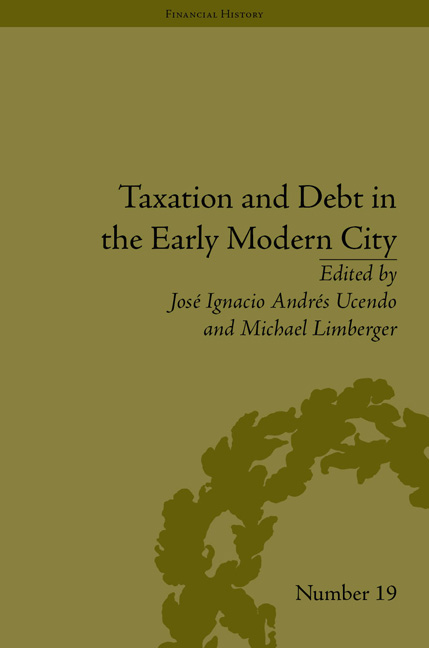Book contents
- Frontmatter
- CONTENTS
- Acknowledgements
- List of Contributors
- List of Figures and Tables
- Introduction
- 1 From Private to Public Management: Tax Farming and Customs Duties in Rome (1630–1700)
- 2 From Taxation to Indebtedness: The Urban Fiscal System of Milan during the Austrias Domination (1535–1706)
- 3 The Urban Tax System in the Kingdom of Naples (Seventeenth to Eighteenth Centuries)
- 4 Public Institutions, Local Politics and Urban Taxation in Seventeenth-Century Aragon
- 5 Taxation and Debt in the Early Modern Castilian Cities: The Case of Seventeenth-Century Madrid
- 6 Tax Collection in Spain in the Eighteenth Century: The Case of the ‘Décima’
- 7 Finances, the State and the Cities in France in the Eighteenth Century
- 8 The Making of the Urban Fiscal System of Antwerp until 1800: Excises, Annuities and Debt Management
- 9 The Dutch Financial System between Public and Private Interests: Urban Debt (1500–1700)
- 10 The Urban Fiscal System in the Habsburg Monarchy: The Case of the Austrian Hereditary Lands in the Sixteenth to Eighteenth Centuries
- 11 Taxation and Debt in Early Modern German Cities
- Notes
- Works Cited
- Index
8 - The Making of the Urban Fiscal System of Antwerp until 1800: Excises, Annuities and Debt Management
- Frontmatter
- CONTENTS
- Acknowledgements
- List of Contributors
- List of Figures and Tables
- Introduction
- 1 From Private to Public Management: Tax Farming and Customs Duties in Rome (1630–1700)
- 2 From Taxation to Indebtedness: The Urban Fiscal System of Milan during the Austrias Domination (1535–1706)
- 3 The Urban Tax System in the Kingdom of Naples (Seventeenth to Eighteenth Centuries)
- 4 Public Institutions, Local Politics and Urban Taxation in Seventeenth-Century Aragon
- 5 Taxation and Debt in the Early Modern Castilian Cities: The Case of Seventeenth-Century Madrid
- 6 Tax Collection in Spain in the Eighteenth Century: The Case of the ‘Décima’
- 7 Finances, the State and the Cities in France in the Eighteenth Century
- 8 The Making of the Urban Fiscal System of Antwerp until 1800: Excises, Annuities and Debt Management
- 9 The Dutch Financial System between Public and Private Interests: Urban Debt (1500–1700)
- 10 The Urban Fiscal System in the Habsburg Monarchy: The Case of the Austrian Hereditary Lands in the Sixteenth to Eighteenth Centuries
- 11 Taxation and Debt in Early Modern German Cities
- Notes
- Works Cited
- Index
Summary
Introduction
Among the factors that influenced the formation of different urban fiscal systems we can count different political traditions on a regional level that have to do with differences in the development of urban autonomy as well as processes of state formation. However, there were also differences between individual cities, according to their socio-economic profile, their political importance or their size, and particular political or economic constellations throughout their history. In the case of Antwerp, the fiscal system showed a considerable number of similarities with other cities of north-western Europe, and in particular within the southern Low Countries. Towns such as Brussels, Bruges, Ghent or Louvain, for example, were comparable to Antwerp in their tax system, which was in great part based on proceeds from indirect taxes on beer, wine and grain. All these cities also frequently made use of annuity sales in order to finance larger expenses, above all taxes to the central government.
Antwerp differed from these cities, however, in one important respect. During the sixteenth century, it was one of the major commercial and financial centres of western Europe. Moreover, it played a crucial role in the financial policy of Charles V who relied heavily on the financial market of Antwerp and also on its public credit. The expenses that went hand in hand with Antwerp's exceptional position would determine its financial policy for the centuries to come.
- Type
- Chapter
- Information
- Taxation and Debt in the Early Modern City , pp. 131 - 148Publisher: Pickering & ChattoFirst published in: 2014



